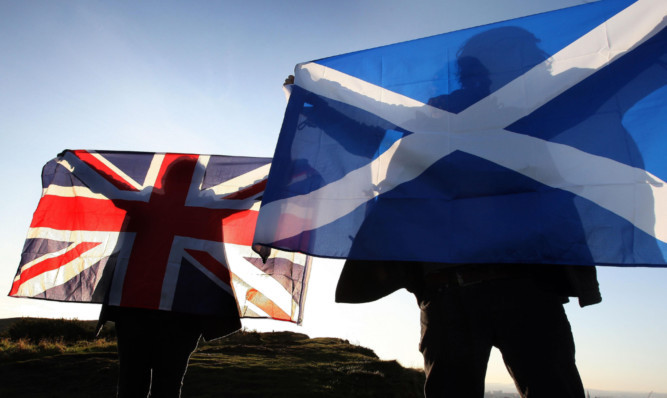The referendum White Paper marked today as Independence Day.
Yet ships’ horns do not blare across the Tay or the Minch in celebration. People are not dancing in the street. The hammers of the Clyde aren’t silent for a national ceilidh they just don’t swing much any more.
This is no special day. As we are no special nation.
We tested an idea and found it wrong. That doesn’t mean we should not keep looking for the answer.
What we discovered is that we are not very independent. Paradoxically, the greatest dependency exposed was the SNP’s with England.
When asked why and how we could become independent, the party was strong on the faults of the UK but bereft of any serious analysis of Scotland.
Like a teenager who blames it all on the parents, all SNP arguments ultimately concluded that Westminster or the South East was “bad”.
There is merit in this; the SNP are to be thanked for effectively kick-starting the federalisation of the UK.
It is the SNP’s accumulation of data on how the UK skews its favours in the direction of London that propelled Wales into devolution and frames the talk of a “Northern Powerhouse”.
The SNP are, it turns out, very good at Federalism or Devo Max. This plays to their dependency these are things defined in relation to the rest of the UK.
Chronically weak
Where they are chronically weak is on independence itself which would remove England from the equation altogether.
Ask the SNP to think in terms of Scotland alone, without reference to the UK or England and that proves a problem. If the party does think Scotland needs to change, it appears to be reform which can wait. If it thinks nothing needs to change, then what’s the point of self-government?
Oddly, this reveals another dependency. When pushed to describe a state on its own terms, the SNP are dependent on some imaginary, sentimental moment in the late 20th Century, when states could afford welfare, people built ships and the NHS was sacrosanct.
The SNP’s vision of the future was to go back to the past. They are dependent on an older version of sovereignty, one not ravaged by globalism, debt and all-powerful finance.
Theirs was an independence which would have protected all the jobs in shipbuilding, all the jobs at Faslane, kept every airbase open. It would have restored the Royal Mail, kept the Queen on the throne, still used sterling. Economic woes could have been corrected by the kind of “growth” not known since 2008. It was a half-remembered world a childish comfort in things we used to know.
Drip-feed of half-facts
All this was tolerated indeed, ferociously defended by supporters because they too had become dependent. Hooked on the drip-feed of half-facts and spin from the Government, the people forgot to champion themselves and instead, defended the SNP.
None of these dependencies proved useful. It isn’t Independence day, the vote was lost, the economic argument now in tatters, the loyal masses still rooting for the Party and cause and so imposing on the country a cautious, conservative government.
In the name of big change one day in the future, we have a government which prefers minimal alteration from day to day.
So cautious, so lacking in independent ideas, it daren’t even mark this day, for fear of reminding people that it bluffed its way through the referendum.
It asked us to change while holding out nothing much better as the reward. Scots will only vote Yes when the prize is worth the risk.
Radical thoughts
The debate showed people were more than happy to engage in radical thoughts. What if independence meant freedom from the grip of international finance, or the rules of globalisation?
More daring still, what if we did shift our taxes from earnings to wealth and used that money to create a world-beating early years programme? What if just imagine it we actually did something to eradicate chronic poverty?
The people are not dependent. When we talked of the future, we talked of one independent of old assumptions and loyalties, of inventing a new world.
For anyone still hankering for another referendum, there are simple lessons. The first is that the UK or England doesn’t matter that comparison ends on day one. Your imagined world must stand on its own terms and be of intrinsic value to the people.
The second is that the nation state just isn’t what it used to be. The levers of government are weaker than before, the global context much stronger.
The third is that starting with an answer independence and then working backwards doesn’t work. It forces people to ignore troublesome facts. We have established that we could be independent if we chose. The issue is what is it we are trying to achieve?
It took a referendum to show we are dependent on old ideas and enemies. Let us make this our independence day the day we independently imagined a better society and found the confidence to fight for it, free of the old dependencies.
